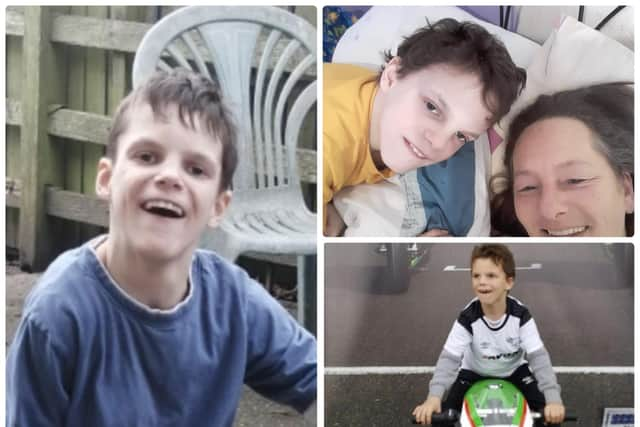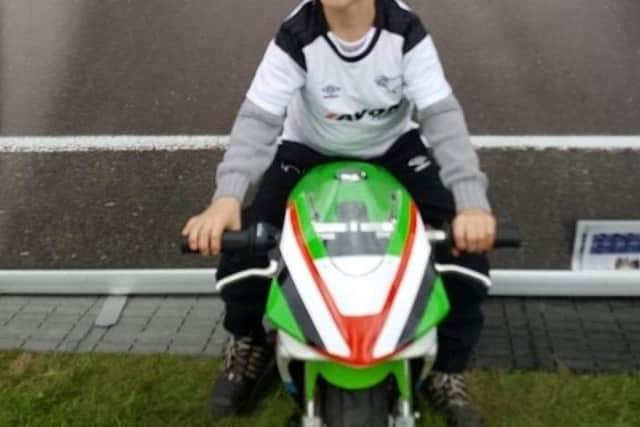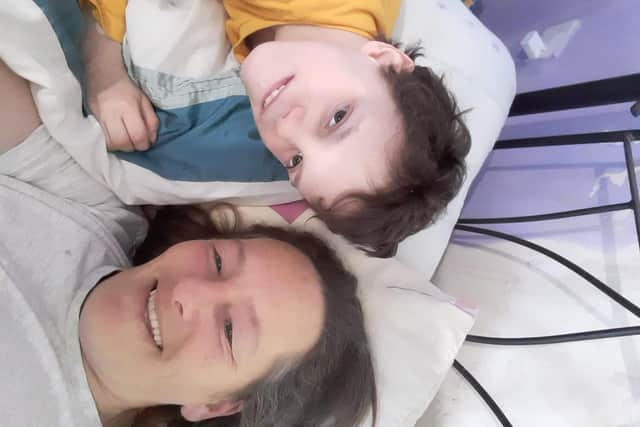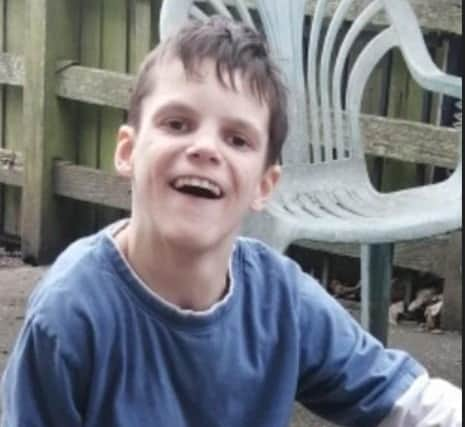Derbyshire mum speaks of heartbreak after death of her “loving little boy” from kidney disease following “significant failures” at hospital
and live on Freeview channel 276
Brandon Dables, aged 12, who had a reduced kidney function and a history of water infections, had been admitted to the children’s emergency department at Royal Derby Hospital in April 2021 with symptoms including vomiting and difficulty seeing.
Test indicated he may have a kidney injury. Around four hours after he was admitted, doctors said he should start intravenous antibiotics and fluids – but these weren’t administered until the early hours of the following morning.
Advertisement
Hide AdAdvertisement
Hide AdBrandon had a number of disabilities, including a chromosome disorder and ADHD, and was also non-verbal. Around three hours after starting to receive fluids he suffered a cardiac arrest, and Brandon died the same morning.


Following Brandon’s death, his mother Marilyn Wright – who is from Ripley – instructed specialist medical negligence lawyers at Irwin Mitchell to investigate his care and support her through an inquest. Marilyn has now joined her legal team in calling for lessons to be learned.
It comes after a Patient Safety Incident Investigation report by the Hospital Trust identified “several significant” failures. These included a failure by doctors to communicate to nurses the “urgency” of getting fluids into Brandon’s body and a failure by nurses to prioritise this.
The failure to deliver intravenous fluids “in a timely manner” was “an unacceptable delay in clinical care,” the report found.
Advertisement
Hide AdAdvertisement
Hide AdAhead of an inquest and around eight months after the report was finalised, the Hospital Trust admitted liability for Brandon’s death following legal submissions by Irwin Mitchell.


An inquest has now concluded that Brandon probably would not have died if he had been given intravenous fluids to treat his kidney infection “within a reasonable timeframe”
Marilyn said: “Brandon was non-verbal but people who knew him well could understand his needs.
“Despite all of his medical diagnoses, Brandon was such a happy and loving little boy. He was always smiling and giggling and had a cheeky side to him. He was a Derby County fan and enjoyed watching and playing football with his brothers.
Advertisement
Hide AdAdvertisement
Hide Ad“In the weeks prior to his hospital attendance, Brandon was well in himself. However, the weekend before he started to feel unwell. He started vomiting over the weekend, refusing fluids and wasn’t himself so knew I had to take him to hospital. He was a popular and much-loved student at Alfreton Park Community special school.


“I kept asking the nurses when Brandon would be given his fluids and antibiotics but they kept saying that they were waiting for a doctor to do that. It just felt like it was taking a long time. I could see Brandon was getting worse and I was anxious and worried. It felt strange that they didn’t put him on fluids straight away as when he has attended previously that was the first thing they did.”
Marilyn added: “When I was told that Brandon had passed I couldn’t quite believe it. Even two years on trying to come to terms with what happened remains incredibly difficult.
“Brandon faced many challenges but with his happy outlook and determination he taught people he met how to be a better person.
Advertisement
Hide AdAdvertisement
Hide Ad“I’m still in trauma about the way Brandon died, but needed to be his voice to at least establish the answers he deserved regarding his care and what happened to him.


“I can’t put into words the distress of losing my child. It’s difficult not to think when Brandon needed help the most he was badly let down. I feel they didn’t take into account his additional needs, and the concerns I had as his mum. I knew him far better than anyone but feel like my concerns weren’t taken seriously.
“I’d do anything to have Brandon back in our lives but know that’s not possible. All I can hope for now is that no one else has to go through what our family continue to go through each and every day.”
Brandon was prone to water infections because his bladder had been affected by a spinal condition. He sometimes had to be catheterised and was undergoing kidney function tests. On April 24, 2021, he became unwell and stopped eating and drinking.
Advertisement
Hide AdAdvertisement
Hide AdBrandon, who had three brothers aged 27, 20 and 18, arrived at the Royal Derby Hospital at around 2.45pm on April 26 2021. Shortly after he was seen by a doctor. He was given antihistamines and paracetamol around 4.40pm. At around 6.25pm a doctor said Brandon should be given intravenous fluids and antibiotics.
Inaccurate information on Brandon’s electronic medical notes about allergies meant antibiotics had to be ordered from an out of hours pharmacy. At around 8.00pm Brandon was transferred to a ward.
There were problems inserting a cannula into Brandon. He started antibiotics at around 12.10am on April 27 and intravenous fluids at around 1.00am.
Just before 4.30am on April 27 2021, Brandon suffered a cardiac arrest. Medics tried to resuscitate him but he was pronounced dead at around 7.10am.
Advertisement
Hide AdAdvertisement
Hide AdThe Hospital Trust’s investigation report also found there was a lack of awareness of the severity of alkalosis – a condition which sees alkali build up in the body and which can be caused by some kidney diseases.
It also concluded that after he died, communication with Brandon’s family in hospital and in the weeks and months after was “unsatisfactory”.
This included Marilyn having to chase a six-week bereavement appointment she was supposed to have with the Trust.
An inquest at Derbyshire Coroner’s Court found Brandon died from a kidney disease caused by intermittent catheterisation and recurring water infections. Coroner Peter Nieto recorded a narrative conclusion.
Advertisement
Hide AdAdvertisement
Hide AdTania Harrison, the expert medical negligence lawyer at Irwin Mitchell representing Marilyn, said after the hearing: “The hurt and pain that Brandon’s family feel following their loss is as raw now as it was when he died.
“Throughout that time Marilyn has been left trying to come to terms with Brandon’s death while at the same time having many concerns about the care he received.
“Sadly Marilyn’s concerns have been validated with investigations identifying serious failings in Brandon’s care which ended with devastating consequences.
“While nothing can make up for what Brandon’s family are going through, it’s now vital that lessons are learned from what happened to him to improve patient safety for others.”
Advertisement
Hide AdAdvertisement
Hide AdDr Sree Andole, Interim Medical Director at UHDB, said: “Our heartfelt condolences remain with Brandon's family, and we are very sorry that aspects of the care we provided to him did not meet the level he or his family needed from us.
“We have taken Brandon's case seriously and acted on our learning to put changes in place, including building a new alert into patient monitoring systems to help respond to changes more quickly, enhanced training for staff to support better communication between teams, and introducing pre-filled syringes for certain medicines so that they can be administered quicker.
“We are grateful to Ms Wright for her strength in sharing her feedback on how we can improve our engagement with families, and we have since proactively invested in specialist bereavement nurses so that we can provide better and dedicated support to families at these incredibly difficult times.”